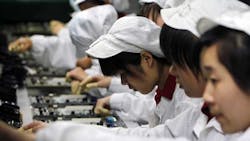Manufacturing Activity in China Reaches Seven-Month Low
BEIJING - Chinese manufacturing activity contracted in February at its worst rate in seven months, British banking giant HSBC said Monday, the latest data indicating trouble in the world's No. 2 economy.
HSBC said its final purchasing managers' index (PMI) for China, which tracks manufacturing activity in factories and workshops, fell to 48.5 last month.
It was a slight increase on the flash PMI of 48.3 the bank released 11 days ago, but it remained the weakest reading since July when the figure stood at 47.7, according to the bank's data.
The index is a closely watched gauge of the health of the Asian economic powerhouse. A reading above 50 indicates growth, while anything below signals contraction.
In January, the index showed contraction for the first time in six months to hit 49.5.
The HSBC release came after China's National Bureau of Statistics on Saturday announced its official PMI reading fell to an eight-month low in February at 50.2.
"The risks to gross domestic product growth are tilting to the downside," Qu Hongbin, HSBC economist in Hong Kong, said in a statement accompanying the data.
He said the government should fine-tune its policies to "stabilize market expectations and steady the pace of growth in the coming quarters".
Beijing has kept its monetary policy relatively tight due to concerns over the country's banking system, with two liquidity crunches last year partly down to official eagerness to impose stricter discipline over lenders as debt levels rise.
Julian Evans-Pritchard, an analyst with research firm Capital Economics, said the tightening has probably weighed on manufacturing activity.
But he warned that the central bank may maintain its hawkish approach and that was likely to remain the primary drag on the manufacturing sector.
"Given that credit risks remain a major concern, we suspect that the People's Bank of China will seek to return to a tighter monetary stance," he said in a research note.
Copyright Agence France-Presse, 2014
About the Author
Agence France-Presse
Copyright Agence France-Presse, 2002-2025. AFP text, photos, graphics and logos shall not be reproduced, published, broadcast, rewritten for broadcast or publication or redistributed directly or indirectly in any medium. AFP shall not be held liable for any delays, inaccuracies, errors or omissions in any AFP content, or for any actions taken in consequence.
